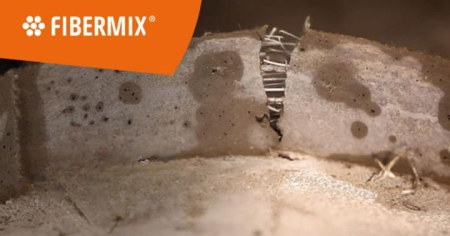
Efficiency of polypropylene fiber in fine-grained concrete
The introduction of cement based polypropylene fiber based mixtures is one of the most effective methods of improving their performance. Polypropylene fibers are recommended to be introduced into the formulation of masonry, plaster, assembly, porous solutions, as they contribute to the improvement of the following parameters:
- frost resistance;
- water tightness;
- fracture resistance;
- impact resistance;
- abrasion;
- corrosion resistance.
Although the effectiveness of polypropylene fiber in fine-grained concrete is undeniable, in Ukraine this technology is not as widespread as in Europe and the Americas. This may be due to the inertia and conservatism of the Ministry of Construction, which is responsible for harmonizing Ukrainian standards with European ones. As such standards will be the basis for design and construction organizations to make extensive use of the useful qualities of polypropylene fiber in concrete.

How the effect of fiber on fine-grained concrete is investigated
The creation of a mixture with the inclusion of fiber must meet the standards of GOST and DSTU. Fine-grained concrete with a cement-to-other-components ratio of 1:3 is used for the study.
Before beginning the study on the effectiveness of polypropylene fiber in fine-grained concrete, a homogeneous mixture of cement and sand with the addition of water is prepared. Subsequently, with constant stirring, the fiber is introduced into the resulting mass. The resulting mixture is divided into samples with dimensions of 40x40x160 mm. These samples are used to determine the levels of compressive strength and tensile strength. A portion of the mixture is allocated to create cylindrical samples, which are used to determine impact resistance.
As a result of research on compressive strength, a slight increase in performance is observed when using a dosage of polypropylene microfiber in concrete amounting to 0.035 – 0.05% by weight of concrete. The fiber compacts the location of the particles in the cement-sand mixture, thereby enhancing the concrete's strength. Polypropylene microfiber creates millions of microlinks: fiber + cement clinker + sand grain, making the mixture denser and more homogeneous. This is achieved with a dosage of only 0.6-0.9 kg/m³.
When using microfibers in flexural tensile tests, the performance increase is minimal, as this type of fiber is not intended to improve these parameters of concrete. Regarding compressive strength, a high dosage has a negative effect on this indicator. However, for criteria such as impact resistance, water permeability, frost resistance, and abrasion, a standard dosage of 0.9 kg/m³ significantly improves these essential characteristics of concrete.
Additional Insights and Applications
Further research into the use of polypropylene fibers in fine-grained concrete reveals additional benefits that extend beyond the parameters traditionally studied. The inclusion of polypropylene fibers not only enhances mechanical properties but also contributes to the long-term durability of concrete under various environmental conditions. The fibers act as a barrier, reducing the permeability of concrete to water and harmful chemicals, which is crucial in environments where structures are exposed to aggressive substances.
Moreover, the ability of polypropylene fibers to reduce shrinkage cracking in the early stages of curing is particularly noteworthy. Shrinkage cracking is a common issue in fine-grained concrete, which can compromise the structural integrity and aesthetics of the finished product. By mitigating this issue, polypropylene fibers help in maintaining the desired structural properties over time, reducing the need for repairs and extending the lifespan of concrete structures.
From an economic perspective, the use of polypropylene fibers in fine-grained concrete presents a cost-effective solution. While the initial material costs may be higher, the long-term benefits of reduced maintenance and extended service life of concrete structures offer significant savings. This makes polypropylene fiber a valuable addition to concrete formulations, especially in regions where infrastructure longevity and resilience are critical.
In conclusion, the adoption of polypropylene fiber in fine-grained concrete offers numerous advantages, not only in terms of improving specific mechanical properties but also in enhancing the overall durability and performance of concrete structures. As construction standards evolve, the integration of this technology in Ukraine and other regions will likely become more widespread, paving the way for more resilient and sustainable building practices.